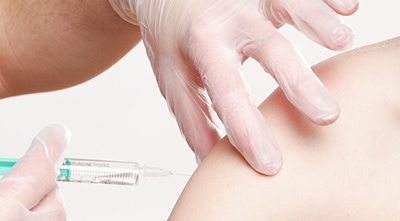Respiratory Syncytial Virus
Get ready to get the shot
| Download this episode | It’s July but it’s not too early to start thinking about getting your annual fall flu shot as well as any other vaccinations you and other members of your family might need. In addition to the influenza vaccine, most Americans will be getting vaccinated for COVID with a new, updated vaccine and possibly receive a newly recommended vaccine for the highly contagious respiratory syncytial virus, better known as RSV. The U.S. Centers for Disease Control and Prevention recently recommended two new vaccines for RSV for adults 60 and older, especially those with chronic heart or lung disease, weakened immune systems or living in long-term care facilities. RSV is common and can cause cold-like symptoms at any age; but it can be dangerous for infants and the elderly. There’s no vaccine yet for kids, but one for pregnant women to prevent illness in infants may be coming soon, pending approval from the U.S. Food and Drug Administration. | Respiratory syncytial virus, or RSV, is a common respiratory virus. It usually causes mild, cold-like symptoms but it can cause serious lung infections, especially in infants, older adults, and people with other medical problems. The virus can spread from person to person through the air by coughing or sneezing or by direct contact, such as kissing the face of a child who has RSV. You can also get it by touching an object or surface with the virus on it, then touching your mouth, nose, or eyes before washing your hands. People who have an RSV infection are usually contagious for three to eight days. But sometimes infants and people with weakened immune systems can continue to spread the virus for as long as four weeks. While it can affect people of all ages, RSV is very common in small children, with nearly all children becoming infected with it by the time they reach two. In the U.S., RSV infections usually occur during fall, winter, or spring. | A person with respiratory syncytial virus, commonly known as RSV, can expect to display symptoms of the virus within four to six days of being infected. The symptoms can range from a runny nose, a decrease in appetite and a light cough to sneezing, wheezing and a fever. These symptoms usually appear in stages instead of all at once. In very young infants, the only symptoms may be irritability, decreased activity, and trouble with breathing. RSV can also cause more severe infections, especially in people at high risk, such as infants, older adults and persons with weakened immune systems. These infections include bronchiolitis, an inflammation of the small airways in the lung, and pneumonia, an infection of the lungs. Severe RSV can be unpredictable and is the leading cause of hospitalization in infants. Unfortunately, people are not able to form a long-lasting immunity to RSV and can become infected repeatedly over their lifetime. | Dr. Robert Hopkins, director of the Division of General Internal Medicine at UAMS, says because the symptoms of respiratory syncytial virus are similar to a common cold, testing usually isn’t required in persons with a mild care, but may be necessary to confirm the diagnosis in those who are at risk or have more severe symptoms. The most common tests are a nasal swab to look for viruses and blood test to check white blood cell counts. Dr. Hopkins says blood and urine cultures may be necessary when infants or older adults are very sick, as RSV-related illness can be difficult to tell apart from bacterial infections without testing. Mild RSV infections will go away in a week or two without treatment. You can use over-the-counter fever reducers and pain relievers to manage your symptoms. Check with your doctor to be sure if an over-the-counter product is safe for your child. Your doctor may also suggest nasal saline drops or suctioning to clear a stuffy nose. | RSV is very contagious but there are some simple steps you can take to help prevent its spread. Avoid close contact with infected people and avoid sharing cups, bottles or toys that may have been contaminated with the virus since it can live on surfaces for several hours. And be sure to thoroughly wash your hands with soap and water after coming into contact with an infected person. In June, the CDC recommended RSV vaccination for adults 60 or older, especially those with chronic health conditions. Schedule an appointment with a medical professional to determine whether the RSV vaccination is right for you. There are currently two licensed RSV vaccines for adults 60 and older and they are expected to become available in the fall of this year. Researchers are working to develop preventative options to help protect infants and young children. High-risk infants may be prescribed monthly injections of palivizumab to help prevent severe RSV.
Transcript
Mild cold-like symptoms
Transcript
Severe cases can be unpredicatable
Transcript
Testing usually isn’t required
Transcript
Taking steps to prevent the spread
Transcript
